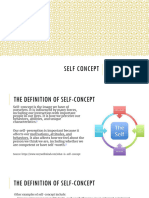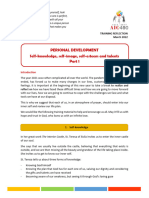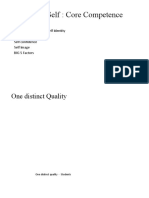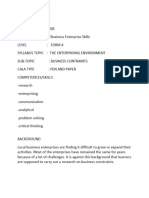0 ratings0% found this document useful (0 votes)
41 viewsUts Lesson 1
Uts Lesson 1
Uploaded by
Pritong SabawThis document outlines the key topics and concepts to be covered in an undergraduate course called "Understanding the Self". The course aims to help students understand factors that influence personal identity from various perspectives including philosophy, sociology, anthropology, and psychology. It will examine the self from different lenses such as the physical, sexual, material, spiritual, political, and digital selves. The main assignments include an activity worksheet and a video presentation about the student's understanding of their self from childhood to present.
Copyright:
© All Rights Reserved
Available Formats
Download as PPTX, PDF, TXT or read online from Scribd
Uts Lesson 1
Uts Lesson 1
Uploaded by
Pritong Sabaw0 ratings0% found this document useful (0 votes)
41 views16 pagesThis document outlines the key topics and concepts to be covered in an undergraduate course called "Understanding the Self". The course aims to help students understand factors that influence personal identity from various perspectives including philosophy, sociology, anthropology, and psychology. It will examine the self from different lenses such as the physical, sexual, material, spiritual, political, and digital selves. The main assignments include an activity worksheet and a video presentation about the student's understanding of their self from childhood to present.
Original Description:
May laman itong mga lesson plan kasama na ang mga activities
Original Title
UTS-LESSON-1
Copyright
© © All Rights Reserved
Available Formats
PPTX, PDF, TXT or read online from Scribd
Share this document
Did you find this document useful?
Is this content inappropriate?
This document outlines the key topics and concepts to be covered in an undergraduate course called "Understanding the Self". The course aims to help students understand factors that influence personal identity from various perspectives including philosophy, sociology, anthropology, and psychology. It will examine the self from different lenses such as the physical, sexual, material, spiritual, political, and digital selves. The main assignments include an activity worksheet and a video presentation about the student's understanding of their self from childhood to present.
Copyright:
© All Rights Reserved
Available Formats
Download as PPTX, PDF, TXT or read online from Scribd
Download as pptx, pdf, or txt
0 ratings0% found this document useful (0 votes)
41 views16 pagesUts Lesson 1
Uts Lesson 1
Uploaded by
Pritong SabawThis document outlines the key topics and concepts to be covered in an undergraduate course called "Understanding the Self". The course aims to help students understand factors that influence personal identity from various perspectives including philosophy, sociology, anthropology, and psychology. It will examine the self from different lenses such as the physical, sexual, material, spiritual, political, and digital selves. The main assignments include an activity worksheet and a video presentation about the student's understanding of their self from childhood to present.
Copyright:
© All Rights Reserved
Available Formats
Download as PPTX, PDF, TXT or read online from Scribd
Download as pptx, pdf, or txt
You are on page 1of 16
Topics:
I. THE SELF FROM VARIOUS PERSPECTIVES
A. Philosophy
B. Sociology
C. Anthropology
D. Psychology
E. The Self in Western and Oriental/Eastern Thoughts
II. UNPACKING THE SELF
A. The Physical Self
B. The Sexual Self
C. The Material Self
D. The Spiritual Self
E. The Political Self
F. The Digital Self
COURSE REQUIREMENT:
1. ACTIVITY WORKSHEET
2. VIDEO PRESENTATION ABOUT “SELF”
(FROM CHILDHOOD TO PRESENT)
What is “Understanding the Self” subject
about?
•Understanding the Self is a fundamental
course in the General Education Curriculum for
tertiary education.
•Itis designed to help the students understand
the nature of identity including factors that
influence and shape personal identity.
The meaning of understanding the self is having insight into
one's own
• behavior
• attitudes
• strengths
• weakness
It is the individual's ability to say and know what he or she
is good at or needs improvement.
Self -understanding is one of the highest goals in
psychology
One's self-perception is defined by
one's
1. self-concept
2. self-knowledge
3. self-esteem
4. social self'.
Self-concept - is a general term used to refer to how someone thinks about,
evaluates or perceives themselves. To be aware of oneself is to have a concept
of oneself.
Self-concept is what we think about the self.
Self-knowledge refers to knowledge of one's own mental states, processes,
and dispositions. Most agree that it involves a capacity for understanding the
representational properties of mental states and their role in shaping
behavior.
Self-knowledge refers to knowledge of one's own mental states,
processes, and dispositions
Self-esteem is an individual's subjective evaluation of their own worth. It
encompasses beliefs about oneself.
Self-esteem is the positive or negative evaluations of the self, as in
how we feel about it.
Social self refers to how we perceive ourselves in relation to others. It
involves relationship building, empathizing, and communicating. A
healthy, or not so healthy, social self will also impact your overall mental
wellbeing and ability to meet life goals.
Social self refers to how we perceive ourselves in relation to
others.
Self-identity is a combination of My ATTRIBUTES, My
ACTIONS and My ASPIRATIONS
My Attributes – Passions, Values,
STRENGTHS
•What are passions – Things and works
that I like.
•What drives me ( My values) .
•Once we start looking at these questions, we
will be able to identify our strengths.
Things that I like to do, things that I am self-
driven and hence they are my strengths.
My Actions – Roles, Associations,
CONTRIBUTIONS
• We are what we do.
• We are also impacted by the company we keep.
A look at what roles we enjoy help us in defining
our self-identity. Our associations also impact how
we and others perceive us.
A hard and honest look at our actions, successes
and failures will help us how we have been able to
contribute to our team or society. Our
contributions also define us.
My Aspirations – Dreams, Goals and PURPOSE
•Our dreams are what we want to be or what we can
be. We must intentionally ask ourselves what our
dreams and aspirations are.
•To achieve our dreams we need to plan and set goals
with time lines.
Our dreams, our actions also help us discover our
larger purpose of our lives. What we want to do for
ourselves and others.
Activity 1
Describe your “SELF”
•based on the Elements of “Self” by David
Myers
or
•based on the concept of “Self Identity”
You might also like
- DEVPSYCH 5 - Cognitive Development During The First 3 YearsDocument3 pagesDEVPSYCH 5 - Cognitive Development During The First 3 YearsRedgie G. GabaneNo ratings yet
- Self Awareness and Values DevelopmentDocument38 pagesSelf Awareness and Values DevelopmentGabriel65% (20)
- Self AwarenessDocument7 pagesSelf AwarenessElmer Asuncion Marquez Jr.100% (1)
- Lesson 1Document24 pagesLesson 1Edward AprostaNo ratings yet
- Week 1 KNOWING ONESELFDocument57 pagesWeek 1 KNOWING ONESELFJuliet HipolitoNo ratings yet
- Perdev 1Document31 pagesPerdev 1john louie casinoNo ratings yet
- Knowing-Oneself PerDevDocument51 pagesKnowing-Oneself PerDevgymaddictobobNo ratings yet
- Understanding SelfDocument24 pagesUnderstanding SelfSC Registrar100% (2)
- LESSON 1 Knowing Oneself - PPTX 20240804 204437 0000Document30 pagesLESSON 1 Knowing Oneself - PPTX 20240804 204437 0000sq89yv2q8yNo ratings yet
- Uts M3Document10 pagesUts M3Reymark CasintoNo ratings yet
- Lesson 1 Self ConceptDocument29 pagesLesson 1 Self Conceptpenales.andrei.oNo ratings yet
- Module I - Self Core CompetancyDocument36 pagesModule I - Self Core CompetancyAditi KuteNo ratings yet
- Self Development and Interpersonal SkillsDocument18 pagesSelf Development and Interpersonal Skillssoham banerjee100% (2)
- Perdev Q1 M1noQDocument35 pagesPerdev Q1 M1noQraffakeshiNo ratings yet
- Personality-Development 3Document31 pagesPersonality-Development 3teenage.pregnancy19No ratings yet
- Uts Reviewer MidtermDocument21 pagesUts Reviewer Midtermjhayrus pletaNo ratings yet
- LESSON 5 - "Self-Concept & Self-Actualization"Document30 pagesLESSON 5 - "Self-Concept & Self-Actualization"mateolladones6No ratings yet
- Lessons 1 2 in PerdevDocument7 pagesLessons 1 2 in PerdevMark Kevin JimenezNo ratings yet
- Managerial Skill Development Unit 1Document15 pagesManagerial Skill Development Unit 1Siriya ManoharanNo ratings yet
- Lesson 1. Knowing OneselfDocument37 pagesLesson 1. Knowing OneselfLawrence gil Orzame lllNo ratings yet
- Self Awareness LectureDocument22 pagesSelf Awareness Lectureparungaorachel7No ratings yet
- Lesson 2 Developing The Whole PersonDocument65 pagesLesson 2 Developing The Whole PersonXrynkaFeigh BullecerNo ratings yet
- Understandingselflesson 1Document28 pagesUnderstandingselflesson 1jokiden16No ratings yet
- Self Awareness LectureDocument22 pagesSelf Awareness Lecturecharliecajoles7No ratings yet
- EuthenicsDocument17 pagesEuthenicspewpewna22No ratings yet
- GEC 001 UTS Chapter 1Document5 pagesGEC 001 UTS Chapter 1edwardcorpuz183No ratings yet
- BS Notes MODULE 1Document8 pagesBS Notes MODULE 1pvr2k1No ratings yet
- Understanding Self Components of Self Self Concept Self Confidence Self Image Sabnam BasuDocument28 pagesUnderstanding Self Components of Self Self Concept Self Confidence Self Image Sabnam BasuRoldan Dela Cruz100% (2)
- Self Awareness and Filipino ValuesDocument40 pagesSelf Awareness and Filipino ValuesSandra Nicole BaangNo ratings yet
- Self Concept 1Document38 pagesSelf Concept 1angel ann100% (1)
- Emotional and Social SelfDocument18 pagesEmotional and Social Selfkhatrinakhate04No ratings yet
- Lesson 2 UNDERSTANDING THE SELFDocument3 pagesLesson 2 UNDERSTANDING THE SELFAorrie100% (1)
- Unit 2 (Part 1) Social Psy - NotesDocument5 pagesUnit 2 (Part 1) Social Psy - NotesNeha KunwarNo ratings yet
- Personal Development PowerpointDocument21 pagesPersonal Development PowerpointGARCIA, KYLA MAE A.100% (2)
- Perdev-Lesson 1Document22 pagesPerdev-Lesson 1mg5302722No ratings yet
- Quarter 1 Lecture in PerDevDocument16 pagesQuarter 1 Lecture in PerDevBawat PiyesaNo ratings yet
- Self ConceptDocument35 pagesSelf ConceptKirtesh Savaliya100% (1)
- عرض تقديمي1Document18 pagesعرض تقديمي1orouba byuNo ratings yet
- Topic 1 The SelfDocument8 pagesTopic 1 The SelfQueenie DomingoNo ratings yet
- The Emotional and Social Self (1696813949)Document26 pagesThe Emotional and Social Self (1696813949)yddbertNo ratings yet
- PERDEVDocument33 pagesPERDEVRhodora Benipayo100% (1)
- AIC Training Reflection Personal Development 2022 ENDocument19 pagesAIC Training Reflection Personal Development 2022 ENmeraygozalNo ratings yet
- PDPR Lesson 1Document24 pagesPDPR Lesson 1Denise PereñaNo ratings yet
- Personal Development: Department of EducationDocument10 pagesPersonal Development: Department of EducationRenji ZabimaruNo ratings yet
- Lesson 4 PsychologyDocument26 pagesLesson 4 PsychologyJeya Plays YT100% (1)
- Uts Module 1Document39 pagesUts Module 1Lexine Mandar SunNo ratings yet
- SelfDocument28 pagesSelfTamo Jit100% (1)
- Final Self ConceptDocument30 pagesFinal Self Conceptamaninder71100% (1)
- Uts Lesson 3Document26 pagesUts Lesson 3aaron danyliukNo ratings yet
- Understanding The SelfDocument11 pagesUnderstanding The SelfBalraj singh NattNo ratings yet
- Big 5Document9 pagesBig 5gurmukh050304No ratings yet
- UTS Module SY 2020-2021Document91 pagesUTS Module SY 2020-2021Desiree Inoferio Adanza100% (1)
- Emotional Awareness Awareness of Thoughts & Sensations Awareness of Strengths & Weaknessess Staying Focussed Self DisciplineDocument14 pagesEmotional Awareness Awareness of Thoughts & Sensations Awareness of Strengths & Weaknessess Staying Focussed Self DisciplinejayantNo ratings yet
- Self As A Cognitive ConstructDocument10 pagesSelf As A Cognitive Constructjosemarineri386No ratings yet
- Personal-Development SLM Q3 Week-1Document8 pagesPersonal-Development SLM Q3 Week-1Jessa Loren EvangelistaNo ratings yet
- Personal-Development SLM Q3 Week-1Document9 pagesPersonal-Development SLM Q3 Week-1Jessa Loren EvangelistaNo ratings yet
- Module I SelfDocument42 pagesModule I SelfNikunjNo ratings yet
- Module 1 PgieDocument43 pagesModule 1 Pgiesarikagr8100% (1)
- Understanding Your Self NowDocument2 pagesUnderstanding Your Self Nowoyewoleayomide175No ratings yet
- Knowing Yourself: A Journey to Self-Awareness and Personal GrowthFrom EverandKnowing Yourself: A Journey to Self-Awareness and Personal GrowthNo ratings yet
- Lss%20 Lecture%20 NotesDocument81 pagesLss%20 Lecture%20 NotesAGBOLOSU MAWUSENo ratings yet
- Teng 2019Document11 pagesTeng 2019Isaac VilchezNo ratings yet
- Organization and Management 4 PDF FreeDocument4 pagesOrganization and Management 4 PDF FreeHumanistaNo ratings yet
- Ipcrf Plan Targets Activities Phase 1 2022 2023Document7 pagesIpcrf Plan Targets Activities Phase 1 2022 2023Lovejoice Cha NnelNo ratings yet
- Madeline Hunter Template 1Document3 pagesMadeline Hunter Template 1api-651603099No ratings yet
- San Agustin National High School Sagbayan, Bohol Detailed Lesson Plan (DLP)Document3 pagesSan Agustin National High School Sagbayan, Bohol Detailed Lesson Plan (DLP)jessel gemalNo ratings yet
- Pratama Et AlDocument7 pagesPratama Et Al95.7anand7014No ratings yet
- Observing Other TeachersDocument2 pagesObserving Other TeachersAngelou LumenNo ratings yet
- English MicroprojectDocument16 pagesEnglish MicroprojectSiddhesh KulkarniNo ratings yet
- Intensive Remedial InstructionDocument27 pagesIntensive Remedial InstructionRita NoitesNo ratings yet
- Y2 The Robot (Reading)Document7 pagesY2 The Robot (Reading)卞智瀚No ratings yet
- LE in English 7 (Q1-W3)Document2 pagesLE in English 7 (Q1-W3)Chiclette GanganNo ratings yet
- Cognitive RestructuringDocument10 pagesCognitive RestructuringLaksh kaur GillNo ratings yet
- Bes Cala Componrnt EeDocument4 pagesBes Cala Componrnt Eecharltonnhamburo24No ratings yet
- Implementation Plan On Brigada PagbilangDocument2 pagesImplementation Plan On Brigada PagbilangAnne Glyziel Pelayo100% (1)
- Infant Sleep and Its Relation With CognitionDocument15 pagesInfant Sleep and Its Relation With CognitionLara GintingNo ratings yet
- HopeDocument16 pagesHopeRonya OmerNo ratings yet
- Ilptlp Casey MorrisonDocument6 pagesIlptlp Casey Morrisonapi-572649381No ratings yet
- Sight Translation IIDocument9 pagesSight Translation IIDenis MoralesNo ratings yet
- Improving Emotional Intelligence (EQ) - Expert GuideDocument8 pagesImproving Emotional Intelligence (EQ) - Expert Guider4kuhdNo ratings yet
- Als152 Refelctive WritingDocument4 pagesAls152 Refelctive WritingNUR SYAFARRA ALYA MOHAMMAD RAMADHANNo ratings yet
- Chap 8 TeslDocument22 pagesChap 8 TeslBNK (SJKC)-0619 Ong Yuan NiNo ratings yet
- B2-C1 Why We Remember and Forget - Memory Idioms A4 Worksheet TVDocument7 pagesB2-C1 Why We Remember and Forget - Memory Idioms A4 Worksheet TVf98ykjhtm8No ratings yet
- Human Factors - DRM DispatchersDocument7 pagesHuman Factors - DRM DispatchersHisham AlatiNo ratings yet
- Template - CP ReflectionDocument3 pagesTemplate - CP ReflectionNallapati AbhiNo ratings yet
- Projekt-Based Learning Ideas in Teaching Foreign LanguageDocument7 pagesProjekt-Based Learning Ideas in Teaching Foreign LanguageCentral Asian StudiesNo ratings yet
- Eng 8 LP4Document8 pagesEng 8 LP4Antonette Gilboy CabrillasNo ratings yet
- Jurnal Metode Understanding by DesignDocument11 pagesJurnal Metode Understanding by DesignNur Safira Dyah PNo ratings yet
- Chapter One To FiveDocument42 pagesChapter One To Fivemuhammaed shehuNo ratings yet

























































































